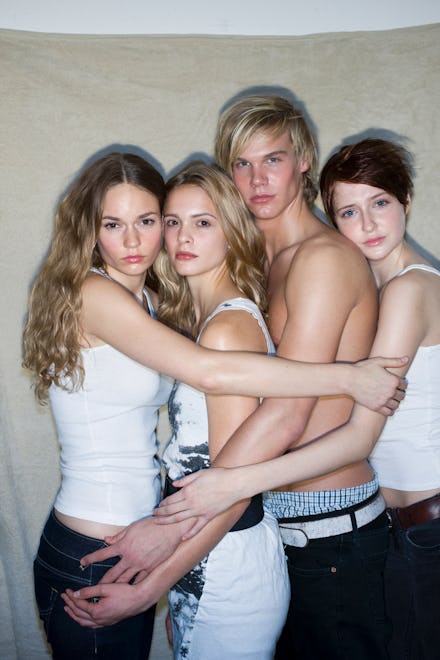When It Comes to Relationships, Turns Out We're Not as Edgy as We Think We Are

How would you feel about an open relationship?
Only 15% of Americans age 18 to 29 would ever consider being in an open relationship, according to a new survey conducted by the Huffington Post and YouGov. That proportion is nearly identical to — not higher than — the numbers for adults age 30 to 44 and 45 to 64.
The survey also found that 18% of 18- to 29-year-olds have been in an open relationship, while only 14% have attended a party where they engaged in sexual activity with multiple partners.
It turns out we young folks might not be as edgy or non-monogamous as everyone assumes. And that's totally OK.
Overexcited headlines: This lukewarm attitude toward open relationships isn't the edgy portrait of millennials the media often paints in articles such as Rolling Stone 's conversation-starting feature on millennials' sex lives. "Millennials realize that they're pushing the boundaries of the sexual revolution beyond what their parents might have expected and their grandparents could even conceive," Alex Morris excitedly reported.
Indeed, Amy Moors, a University of Michigan sex researcher, told Mic, "Questioning the often unrealistic ideals and expectations of monogamy is having a moment right now."
But despite the increased interest in casual sex and hookups, data suggests that millennials are having sex about as frequently as previous generations. And while we're surrounded by a culture that's more sex-positive than ever, the 20-something dating landscape itself might be tamer than we envision.
Moors' research shows that many young men and women have positive attitudes towards open relationships and express an interest in swingers' parties and threesomes, but most couples still don't actually engage in non-monogamy.
Other research suggests that even if we behave non-monogamously, we still prefer to avoid labels. "When college-aged men were sexually unfaithful to their partners, their desire to be thought of as monogamous by their peers and society is very important," Moors explained previously to Mic. "In other words, these men were engaging in non-consensual non-monogamy, but still wanted to be seen as monogamous."
Moreover, open relationships aren't exactly a new fad (think swingers' parties from the '70s). "People who actually engage in consensual non-monogamy [are], on average, in their 30s and 40s," Moors said.
Finding the right fit: Our lack of embrace of open sexuality isn't necessarily a bad thing. In fact, while open relationships can be just as healthy and fulfilling as monogamous relationships, they only work if you enthusiastically want it enough to put in the time and dedication.
A major principle of open relationships and the polyamory community, for example, is constant communication. That involves disclosing partners, remaining happy for your partner and yes, frequently checking in that an open relationship is still what works for you.
While the prevalence of hookups might leave most young people in ostensibly open relationships throughout their 20s, when push comes to shove and we settle down, the majority of us seem to want something a bit more traditional. The astronomical rise of cohabiting partners, while seen as untraditional, may actually suggest that, despite an interest in open relationships, most still don't practice it.
Or, at least, they don't want to say they do.
"20-somethings seem to be really be into consensual non-monogamy," Moors said. "At least theoretically."